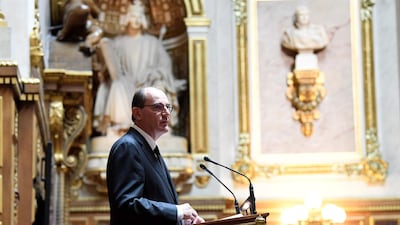Newly appointed French Prime Minister Jean Castex has put the struggle to contain Islamist networks' grassroots influence at the centre of his administration's agenda for the year ahead.
In the run-up to presidential elections in 2022, President Emmanuel Macron has sought to define his manifesto for France more clearly. His choice of Mr Castex as prime minister last week was portrayed as a rejuvenation of Mr Macron's manifesto for changing France.
Speaking to parliamentarians before a summer break, Mr Castex said there would be a new bill to revive the separation of secular institutions, such as education and community organisations, from religious practice.
"No religion, no school of thought, no organised group can appropriate public space and attack the laws of the republic," Mr Castex said. "In particular, we must name things as they are: fighting radical Islamism in all its forms is and remains one of our major concerns. The whole government is concerned."
The technocrat plucked from leading France's Covid-19 response said the legislation would take on "all forms of violence, discrimination, racism, anti-Semitism". The measure to be presented at the start of the school year will have the objective of "preventing certain groups from closing around ethnic or religious affiliations".
"[The republic] is today shaken in its foundations by the coalition of its enemies: terrorists, extremists, conspiracies, separatists, communitarians,” he added.

In his first days in office Mr Castex visited Dijon where violent clashes had broken out between members of the Chechen and North African communities. There he had told the police to act "at the heart of the republican and democratic pact that the state intends to defend".
Mr Macron has made fitful efforts to address the issue of encroachment on the public space by Islamist networks around France.
A report published by the Paris-based Institut Montaigne in 2018 provided a portrait of how Islamist ideas had the support of only a minority of French Muslims but exercised a disproportionate influence.
Written by the French author Hakim El Karoui, the report called for a revival of the narrative of the republic to counter the arguments of the Islamists.
"It appears that Islamism is a powerful but poorly understood contemporary ideology," it said. "Its aim is clear: to create a global project with religion as the life framework and the project for the individual and society. Its values are often opposed to Western values: group vs individual, religious norm vs individual freedom, inequality between men and women vs the pursuit of equality, etc.
"The response to the development of Islamism in France and Europe should be driven by reason rather than fear. To understand this ideology’s creation and dissemination mechanisms. To imagine a new organisation of Islam, in France and in Europe. For European Muslims to promote an alternative discourse, compatible with our societies."


